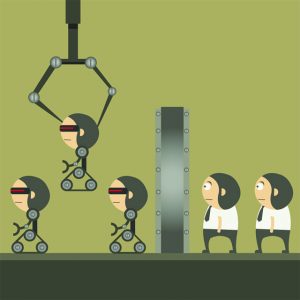The new industrial revolution -- machines rise up to become our equals
 The Internet of Things is just the latest buzzword that is being used to push all manner of products. Let's cut to the chase -- it's just about "stuff" (other than obvious things like computers and phones) connecting to the internet. Nothing more than that. But this dismissive-sounding definition is not meant to undermine the importance or the significance of the IoT. We've spent the last 20 years or so getting used to the idea of accessing the web, harnessing what it has to offer, exploiting it in various ways and finding all manner of methods of using it to make life easier, more entertaining, and more profitable. The evolution of the Internet of Things sees this taken to the next level.
The Internet of Things is just the latest buzzword that is being used to push all manner of products. Let's cut to the chase -- it's just about "stuff" (other than obvious things like computers and phones) connecting to the internet. Nothing more than that. But this dismissive-sounding definition is not meant to undermine the importance or the significance of the IoT. We've spent the last 20 years or so getting used to the idea of accessing the web, harnessing what it has to offer, exploiting it in various ways and finding all manner of methods of using it to make life easier, more entertaining, and more profitable. The evolution of the Internet of Things sees this taken to the next level.
We are on the cusp of a new industrial revolution. Many would say that the wheels are already in motion. The tired -- very, very tired -- example of what the Internet of Things is about, is the prospect of owning a fridge that will be aware of when you run out of milk, and then either alert you or place an order on your behalf. This is a very simplistic view of things, but it is the communication between devices that will be the hallmark of things to come. Inter-device communication, or machine-to-machine (M2M) connectivity. Devices that can be left to their own devices (ahem) are approaching in ever-growing numbers, and there are advantages to be gained.
A report by Westbase Technology shows just what could be gained from the spread of M2M technology, and shows that we may not have to wait all that long to start reaping the benefits. More than just a technology, M2M is predicted to become an industry in its own right -- one worth an estimated $950 billion globally by 2020. We're not quite at the stage that machines and devices are becoming sentient, but there are growing legions of hardware that can be left to self-manage whilst serving us.
Huge savings are to be made through employing machines that can report back to us without the need for human interaction. Think security monitoring, access rights and early warning systems. Think automation -- we don’t need to sit in front of a machine to ensure that it does its job; it just does it. Now it is becoming increasingly feasible for one machine to tell another what to do, to respond to the environment and other variables. Realtime feedback can be used to increase efficiency, maximize profit and minimize the need for unreliable humans.
We're reaching the stage at which computers and machines are not minions to be controlled by us; they are our equals and will increasingly be found working alongside us, making decisions and being trusted with responsibilities. But ultimately the machines will continue to serve us, rather than us them -- assuming there is not a robot uprising.
The infographic below shows how the M2M industry could pan out over the next decade in Westbase Technology's vision of the future.

Courtesy of: Westbase Technology
Photo Credit: Arjoe /Shutterstock